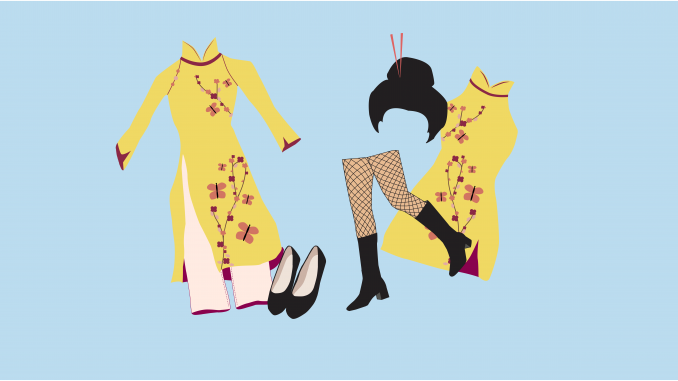
When clothing retailer Fashion Nova debuted its “Geisha costume” for Halloween, people accused the store of cultural appropriation.
The costume inaccurately represented a Japanese geisha, a traditional entertainer. This is often incorrectly depicted in Western Culture as a person who does sex work, according to the New World Encyclopedia.
The issue shed light on the larger issue of Asian cultural appropriation, which is not limited to Japanese culture.
Dustin Kidd, a sociology professor, said cultural appropriation doesn’t have a blanket definition that applies to everyone, but is rather how an act makes someone feel.
“It’s about the experience of a feeling that one objective scholar can’t identify,” Kidd said. “To see it and to know it is a different thing, to know what that wound feels like is different.”
Lia Nguyen, a sophomore music therapy major from Vietnam, said she feels offended when aspects of her culture, including the Ao Dai, a long gown worn during special occasions, are appropriated for Halloween.
“The history behind our clothes took hundreds of years to develop,” Nguyen said. “We only wear those traditional clothes during really important holidays,” she said.
Traditional clothes are typically worn on important events like Lunar New Year and the first day of school.
This value is not represented in Halloween costumes, which mimic traditional Asian dress for about $20.
An Authentic Vietnamese Ao Dai can range from $300-$1,000, according to a Vietnamese travel agency.
“It has a lot of meanings,” she added. “It’s really sad to see your own culture being disrespected in a way.”
“It alters the view,” Nguyen added. “For example, a lot of people here they don’t really know much about the world outside. So when they see someone who wears Chinese or Vietnamese traditional clothes during Halloween and [does] stereotypical gestures, it is disrespectful to the culture.”
Kidd echoed these sentiments, reflecting on both personal and large-scale impacts of appropriation.
“There is a sense that their community has been stolen from and someone else is benefiting from what they stole from that community,” Kidd said.
Nguyen said that when people appropriate Vietnamese culture during Halloween, they further undermine its significance. She added that because college Halloween celebrations are largely centered on looks and partying, her culture is presented in a superficial light.
“For me, Halloween is about appearance,” Nguyen said. “So when you adorn yourself in traditional clothes it should have more meaning than that.”
Dan Chua, a junior communication studies major who is Malaysian-American, said Asians and Asian-Americans are often stereotyped as shy and excellent in martial arts and academics. When people appropriate Asian culture, these stereotypes are reinforced.
“If you took Malaysian culture and boiled it down to just one action or one dish, you’re losing a lot of depth there,” Chua said. “But if people were to relate to it and try to experience it, that would be good. They’re getting a little taste.”
For Chua, “getting a little taste” means literally just that. He said trying food from another culture is a way to appreciate a culture in a respectful way without wearing their clothes. He suggested people not only try popular dishes that might simulate the culture, but also to branch out beyond those.
Nguyen added that sharing food is a better way to engage in a cultural exchange. She encouraged students to try different food trucks and understand the history behind various dishes.
“Obviously as you can see from different food trucks at Temple, Asian food is diverse,” Nguyen said. “There’s Chinese, Korean, Vietnamese, Thai, Japanese. They’re all very distinct, and each culture has interesting history behind the food that we eat and through that you can understand more.”
Dan Chua is a photographer for The Temple News. He played no part in the reporting and editing of this story.



Be the first to comment